|
|
|
|
|
Interdisciplinary Japanese Studies On Site
|
DIJ Newsletter 77
Autumn 2024
|
|
|
|
|
|
Welcome to the Autumn 2024 issue!
|
|
The city of Venice is charging an entrance fee for visitors, thousands are demonstrating against the excess of tourists in Barcelona and Mallorca, and even Mount Everest is overcrowded: the phenomenon of mass tourism is meeting with resistance from locals around the world. Mass tourism has also become a problem in Japan, even away from the well-known tourist destinations of Tokyo, Kyoto, and Nara. In spring, the small town of Fujikawaguchiko hit the global headlines. The surroundings of one of its local convenience stores offered a view of Mount Fuji that was particularly popular with tourists. To deter them, a black wall of fabric was erected blocking the spectacular photo spot. In the Catchword section of this issue of the Newsletter, Franz Waldenberger takes a critical look at ‘overtourism’ and explains the advantages and disadvantages of Japan's popularity with foreign tourists.
|
|
Also in this DIJ Newsletter: new team members, recent and forthcoming publications, upcoming and past events as well as farewells.
|
|
We hope you will enjoy exploring this edition of the DIJ Newsletter. If you haven't yet done so, you can subscribe to receive it directly to your inbox here. We also welcome your feedback and email address updates via email to newsletter@dijtokyo.org
|
|
From all of us at the DIJ, we wish you a pleasant autumn season.
|
|
|
|
|
|
Research News ・Neues aus der Forschung ・研究活動ニュース
|
|
|
|
Research Project 'Transforming Empire'
|
|
Dolf-Alexander Neuhaus’ research project “Transforming Empire: Japanese technical assistance and education in postwar Asia” analyses the role of educational programmes and infrastructures within the context of Japanese development aid. Based on case studies from East and South East Asian countries, his project examines the dissemination, implementation, and adaption of Japanese technical assistance and education by various stakeholders, including public and private actors and organizations in recipient countries and Japan. The project also seeks to understand how these initiatives support the economic and social advancement of recipient nations while at the same time serve as a tool for maintaining Japan's influence across the region.
|
|
|
|
|
|
|
Virtual ISEAS-DIJ Meeting
|
|
In July, researchers from the DIJ met online with the team of researchers affiliated with the Italian School of East Asian Studies (ISEAS). Based in Kyoto, the ISEAS serves as a bridge between Italian and Japanese academic institutions. The DIJ and ISEAS are currently deliberating options to strengthen their cooperation within the framework of European Japanese Studies institutions based in Japan.
|
|
|
|
|
|
New Publications ・Gerade erschienen ・新刊
|
|
|
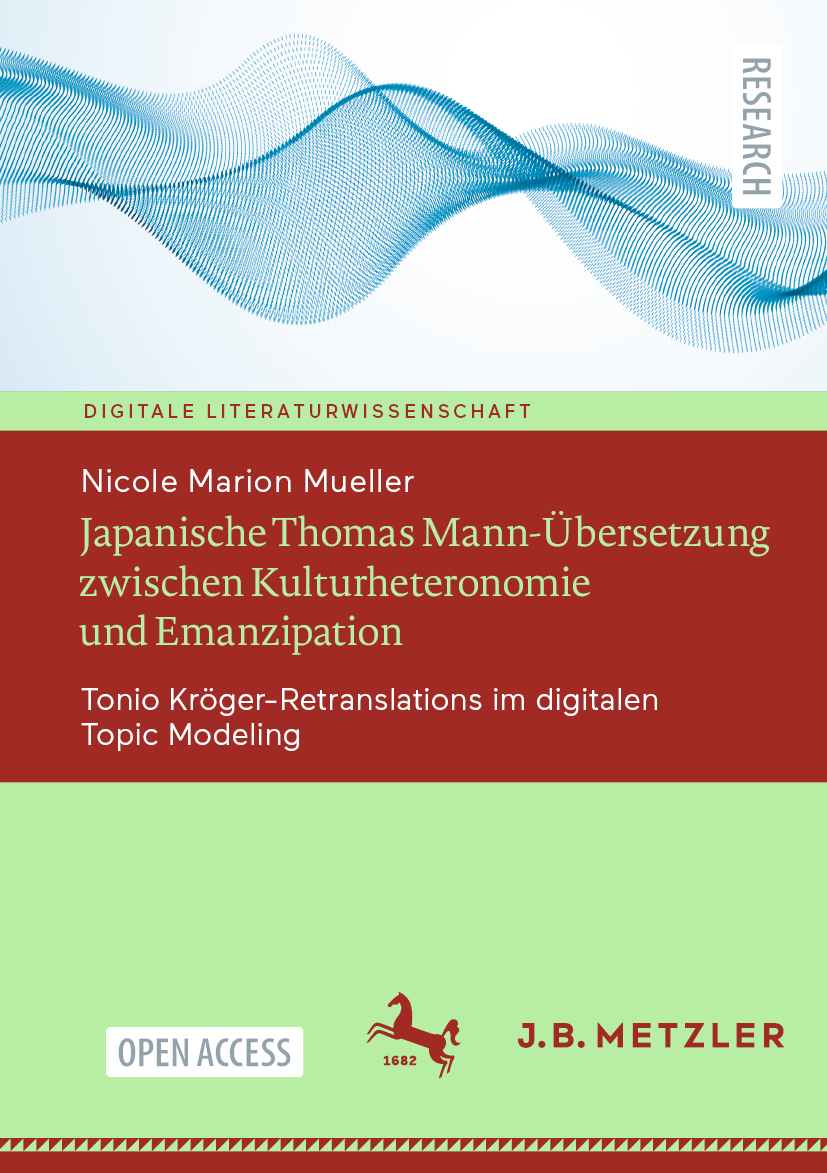
|
Cover © SpringerLink
|
|
New Book on Thomas Mann Translations
|
|
In her new open access book Japanese Thomas Mann translation between cultural heteronomy and emancipation (in German), Nicole Marion Mueller uses innovative digital methods to study Japanese translation pluralism in the 20th century. Focusing on Thomas Mann's novel Tonio Kröger, she not only demonstrates the intensive reception of Mann's literary works in Japan. Through her mixed methods approach based on digital topic modeling, Nicole also makes previously hidden interactions between the re-translated texts and their historical contexts accessible.
|
|
|
|
|
|
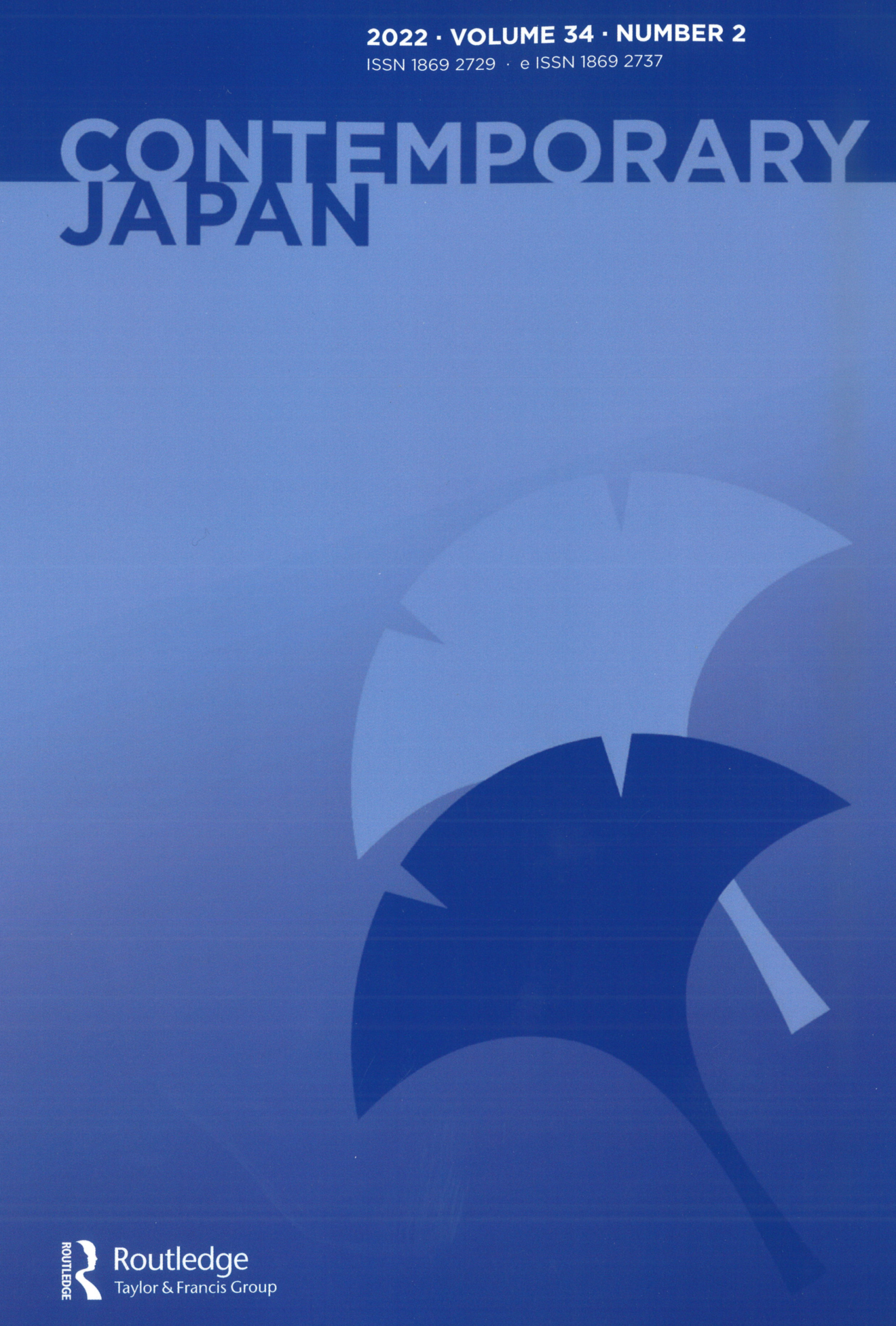
|
Cover © Taylor&Francis
|
|
New Issue of Contemporary Japan
|
|
The new issue of CJ features five research articles, the VSJF award-winning paper, and a book review section. The articles include inquiries into national apologies; the relationship of income inequality with the size of the government; the politics of depopulation in local elections; inclusiveness in terms of consultation on disability policies; and foodscapes in post-3.11 Japanese literature. The VSJF award-winning paper by David Adebahr analyses conversations and thought processes behind Japan’s security policy among Japanese politicians and bureaucrats. The book review section includes recent publications on religion and fundamentalism, the history of Kyoto, public discourse on fertility policies, and the use of robots in eldercare.
|
|
|
|
|
|
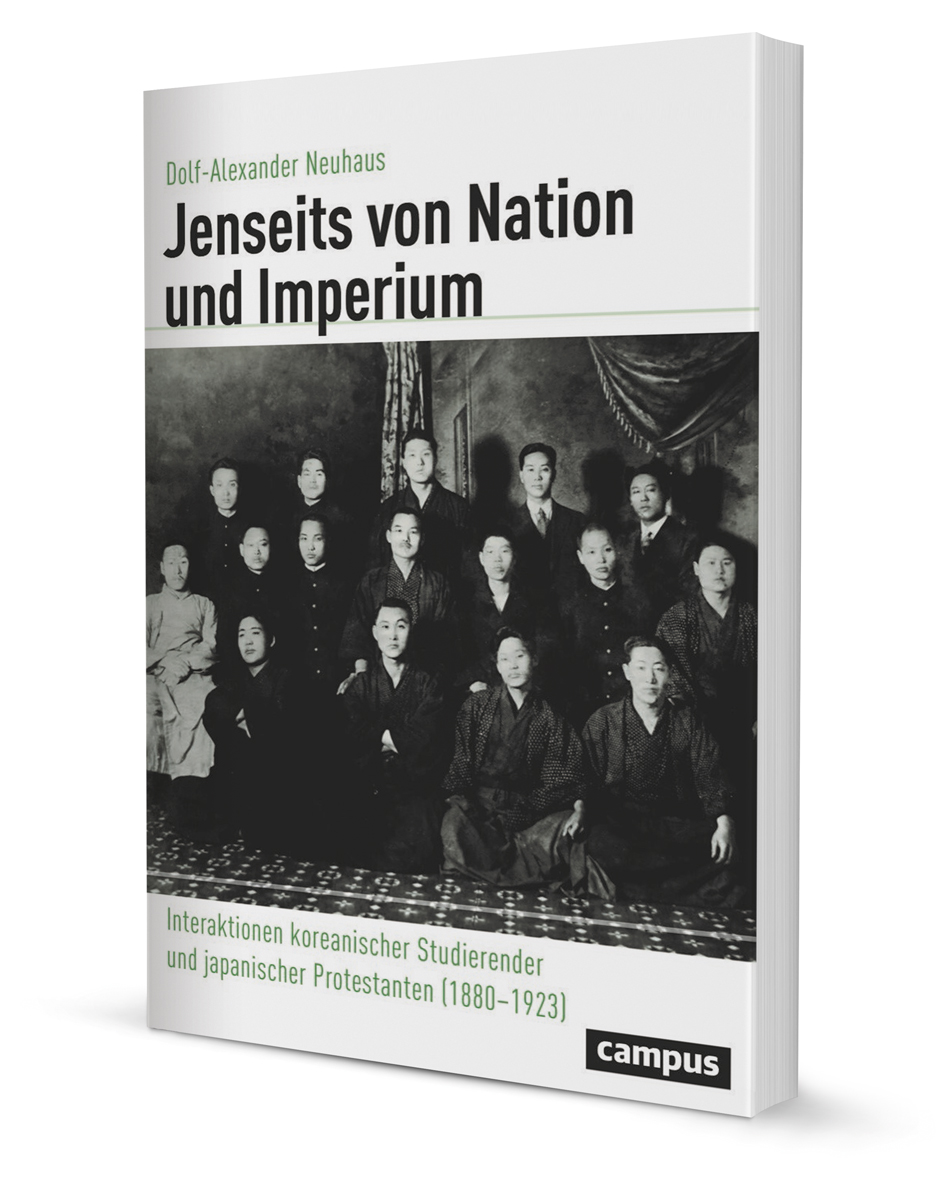
|
Cover © Campus
|
|
Book on Korean-Japanese Interactions
|
|
What role did Korean students who came to Japan between 1880 and 1923 play in the discourse on Japan's colonial and East Asian policies? How did their encounter with Japanese intellectuals of Protestant faith, especially in the environment of the YMCA and the Imperial University of Tokyo, influence their views? Drawing on a wide range of Japanese and Korean sources, Dolf-Alexander Neuhaus' new book Beyond Nation and Empire (in German) examines how these students and intellectuals discussed Japanese colonial rule in Korea and the 'Korean question' and how their exchange of ideas influenced Japanese and Korean perceptions of empire, nation, and East Asia.
|
|
|
|
|
|
Recent journal articles, book chapters, and outreach articles by DIJ researchers:
|
- Barbara Holthus, “ドイツの出生率推移を紐解く” [Unraveling Germany’s fertility rate development]. 年金と経済 [Pension and the Economy], 43(2), 12–31.
- Harald Kümmerle, “Tannaka Tadao‘s 1938 paper on the duality of noncommutative topological groups and its historical background”. Duality in 19th and 20th Century Mathematical Thinking, eds. Ralf Krömer/Emmylou Haffner, 255–434.
- Harald Kümmerle, “Calibrating Social Theories of Digital Technology based on Japan's COVID-19 Response: Surveillance Capitalism and Cyber Civilization”. KGRI Working Papers, No. 3 (online, 23 August 2024).
- Nicole M. Mueller, “Japanese Retranslations in the 20th and 21st Century – between Scholarly und Literary Translation, between Heteronomy and Autonomy towards the West”. Routledge Handbook of East Asian Translation, eds. Ruselle Meade/Claire Shih/Kyung Hye Kim, 257–272.
- Dolf-Alexander Neuhaus, “El encuentro del protestantismo japonés con la Corea antes de la primera guerra sino-japonesa” [The encounter of Japanese Protestantism with Korea before the first Sino-Japanese War]. Revista Internacional de Estudios Asiáticos, 3(1), 169–203.
- Sebastian Polak-Rottmann, "Review of Hokkaido Dairy Farm: Cosmopolitics of Otherness and Security on the Frontiers of Japan". Japanese Studies, Vol. 44, No. 2, 260–262.
- Celia Spoden (and Olga Wenzel, Anke Erdmann, Gerald Neitzke, Irene Hirschberg), ”Coping and end-of-life decision-making in ALS: A qualitative interview study”. PLOS ONE, 19(6) (online, 26 June 2024).
- Franz Waldenberger, “Reiches Land – armer Staat: Japans Wirtschaft im Griff der Demografie” [Rich country - poor state: Japan's economy in the grip of demographics]. Forschung und Lehre, 7/24, 498–499.
|
|
|
|
|
DIJ News ・Aus dem DIJ・研究所ニュース
|
|
|

|
Poster © MWS
|
Travel Grants for Multi-Country Research
|
|
Are you an early-career researcher looking for funding for research stays abroad of up to one month? Why not consider applying for a Gerald D. Feldman Travel Grant for researchers in the humanities and social sciences? Offered by the Max Weber Foundation (MWS), the travel grants allow you to conduct your own research project in two or three of the countries which are home to MWS institutes, including the DIJ. Application deadline: 6 October 2024.
|
|
|
|
|
|

|
Photo © DIJ
|
|
New PhD Students at the DIJ
|
|
From July to September, the DIJ has welcomed three new PhD students to conduct research in Japan: Björn Becker (University of Trier, right), Michel Hohendanner (Technical University of Munich, centre), and Ralf Windhab (University of Vienna, left). Björn's research examines the influence of education on differences in life satisfaction among Japanese married couples. Michel's project engages with citizens and local communities to explore their perceptions of generative AI. And Ralf researches how men engaged in domestic work are portrayed in manga.
|
|
|
|
|
|
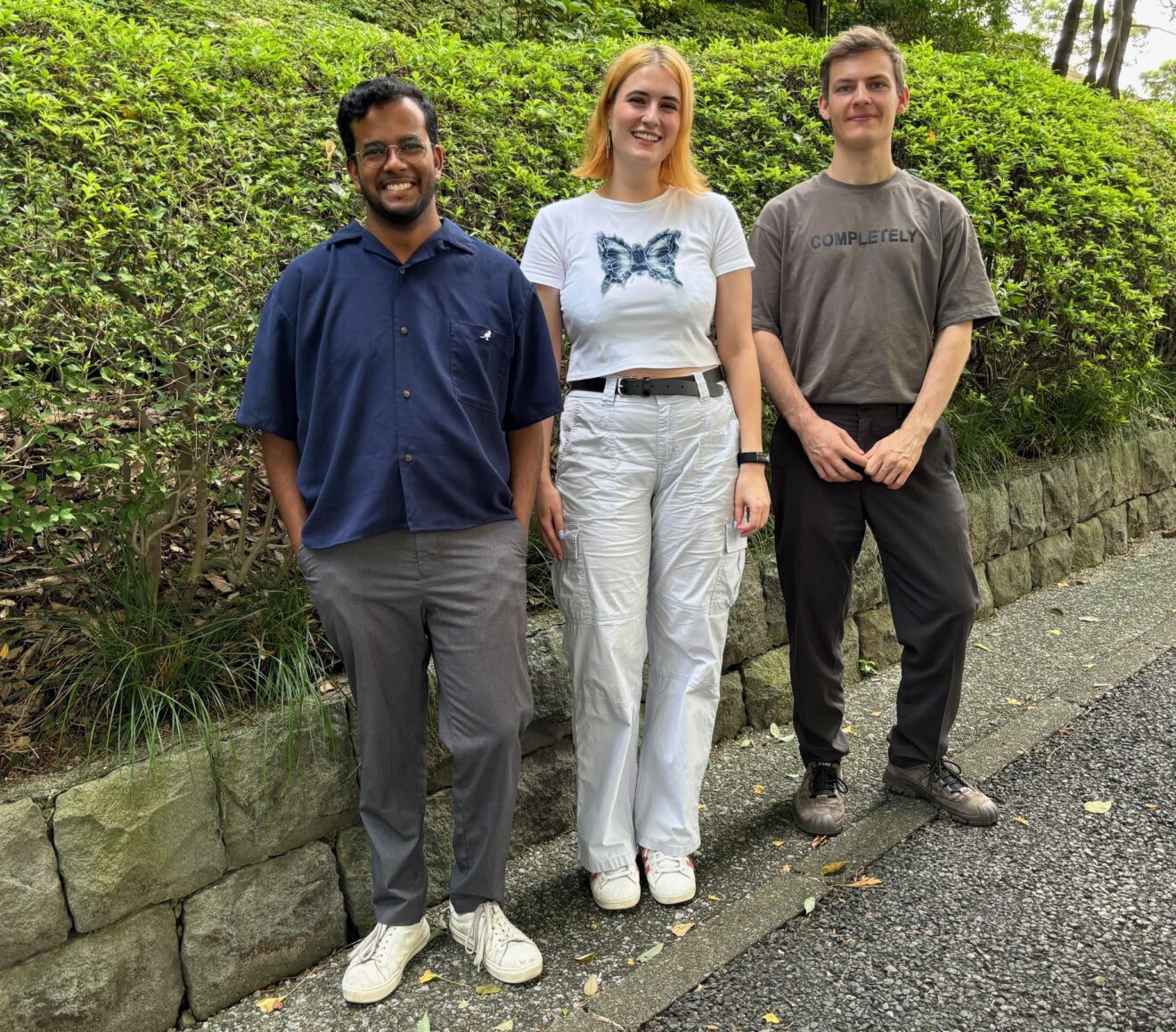
|
Photo © DIJ
|
|
In August and September, three new interns joined the DIJ: Marc Henrici (HU Berlin) supported Carolin Fleischer-Heininger and Dolf-Alexander Neuhaus with their research projects in the fields of literature and history. Eva Schellenberg (University of Passau) joined our team after a study-abroad year at Musashi University and assists Nicole M. Mueller with her research and upcoming conference. Prannavan Surendran (LMU Munich) finished his semester abroad at Kyushu University and now supports Torsten Weber with his research and in the field of public relations. If you are interested in joining our team as an intern, please see our guidelines here (in German). We look forward to your application!
|
|
|
|
|
|
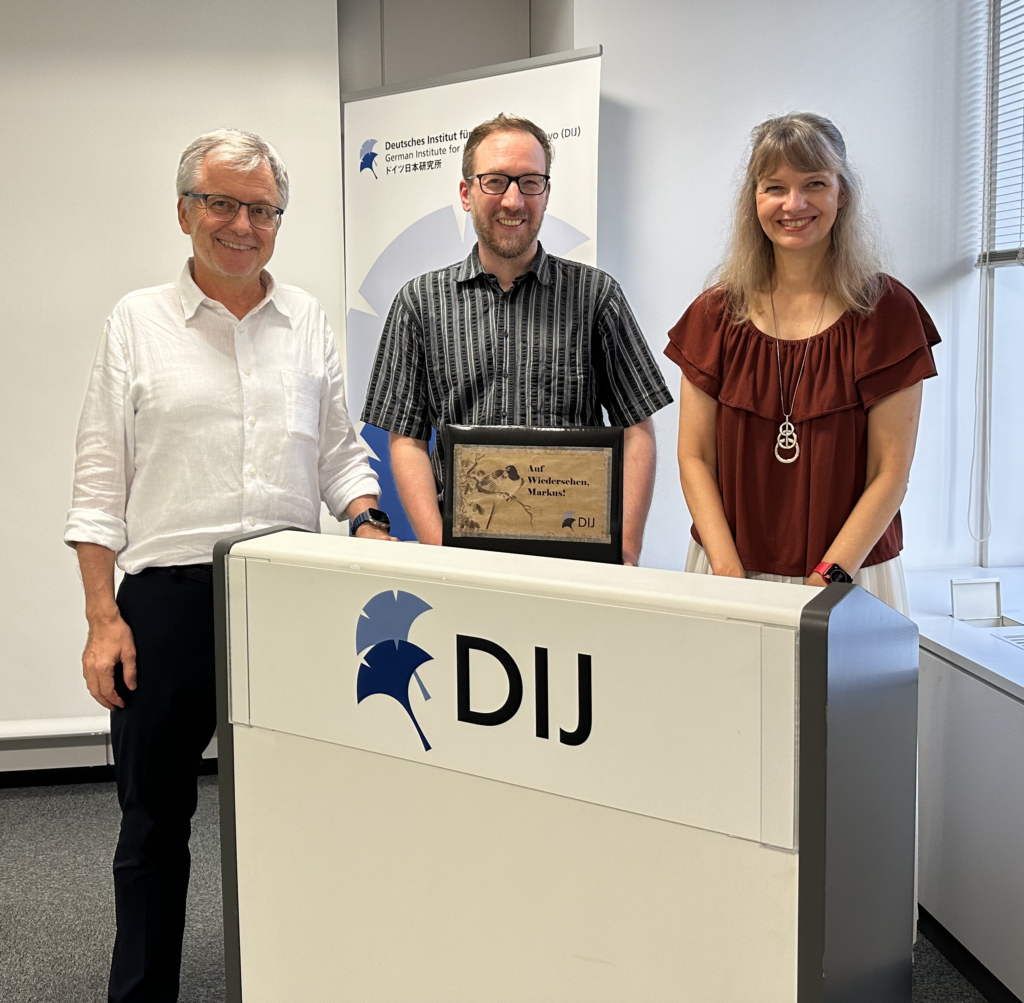
|
Photo © DIJ
|
|
Goodbye to DIJ Researcher Markus Heckel
|
|
After nearly six years at the DIJ, Markus Heckel has left our team to start a new position as head of programmes at the German Centre for Research and Innovation Tokyo. At the DIJ, Markus' research focused on the Bank of Japan's monetary policies and the future of the financial system in the digital age. Markus was also head of the research cluster 'Sustainability and Resilience'. The photo shows Markus (centre) with DIJ director Franz Waldenberger and deputy director Barbara Holthus.
|
|
|
|
|
|
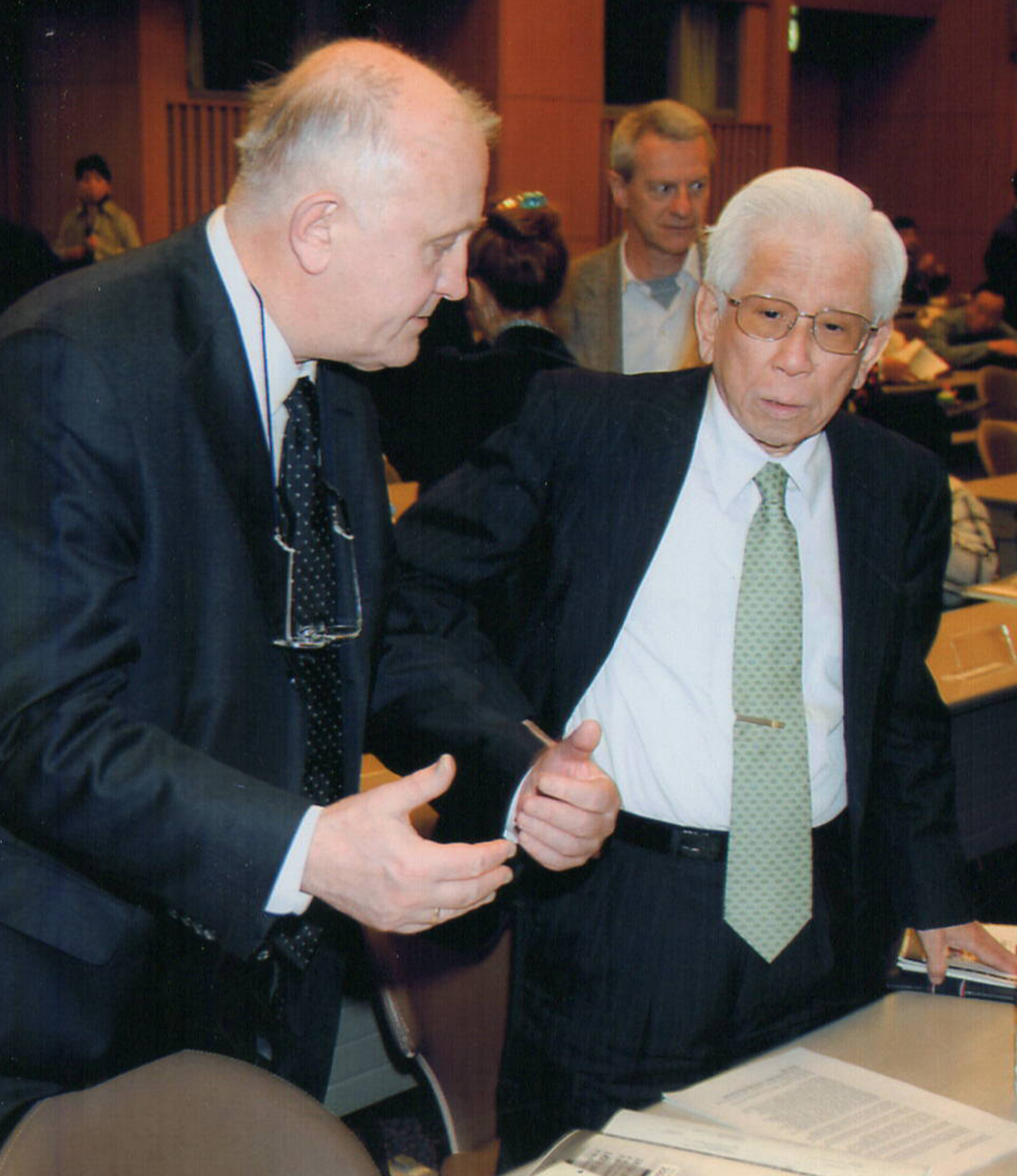
|
Photo courtesy of Josef Kreiner
|
|
In Memoriam Kiyonari Tadao (1933-2024)
|
|
The DIJ mourns the loss of Kiyonari Tadao, who passed away in July at the age of 91. From 1972 until his retirement in 2005, he was Professor of Business Administration at Hosei University in Tokyo. From 1996 to 2005, he also headed the university as president and promoted its internationalisation. He supported the DIJ in many ways after its foundation in 1988, for example by organising the library cooperation that still exists today. In 1994, he played a major role in the preparation and support of a DIJ-organised conference on economic integration and regional development in East Asia. An obituary by DIJ founding director Josef Kreiner (pictured left) is available on our website.
|
|
|
|
|
|
|
|
Upcoming Events ・Kommende Veranstaltungen・今後のイベント
|
|
|

|
Poster © DIJ
|
Imagined Futures in Japan and Beyond
From 9 to 11 October the DIJ, in collaboration with the German Centre for Research and Innovation (DWIH) Tokyo, hosts the international workshop 'Imagined Futures in Japan & Beyond'. Twenty-five international scholars and practitioners from Japan’s tech industry will discuss visions of emerging technologies, of their environmental and societal impact, and of Japan as a 'futuristic' nation through the lens of 'narrative' and 'sociotechnical imaginary' theoretical frameworks. The workshop will open with a DIJ Forum with keynotes by Fritz Breithaupt (Indiana University Bloomington) and Hirotaka Osawa (Keio University).
|
|
|
|
|
|
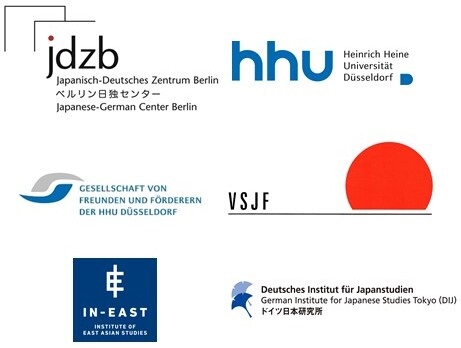
|
Logos co-organisers
|
VSJF Conference 'Sustainability in Japan'
Making human activity on Earth sustainable is one of the greatest challenges of mankind. But what sustainability means, how it can be achieved, how it is politically negotiated, and which actors are involved differs across the world. This year's annual conference of the German Association for Social Science Research on Japan (VSJF) focuses on economic, societal, and political perspectives to understand how issues of sustainability are understood, framed, and pursued in Japan. The conference is co-organised by the DIJ and takes place at the Japanese-German Center Berlin from November 15 to 17.
|
|
|
|
|
|
Save the date - more upcoming DIJ events:
|
|
|
|
|
|
Past Event ・Vergangene Veranstaltung・最近のイベント
|
|
|
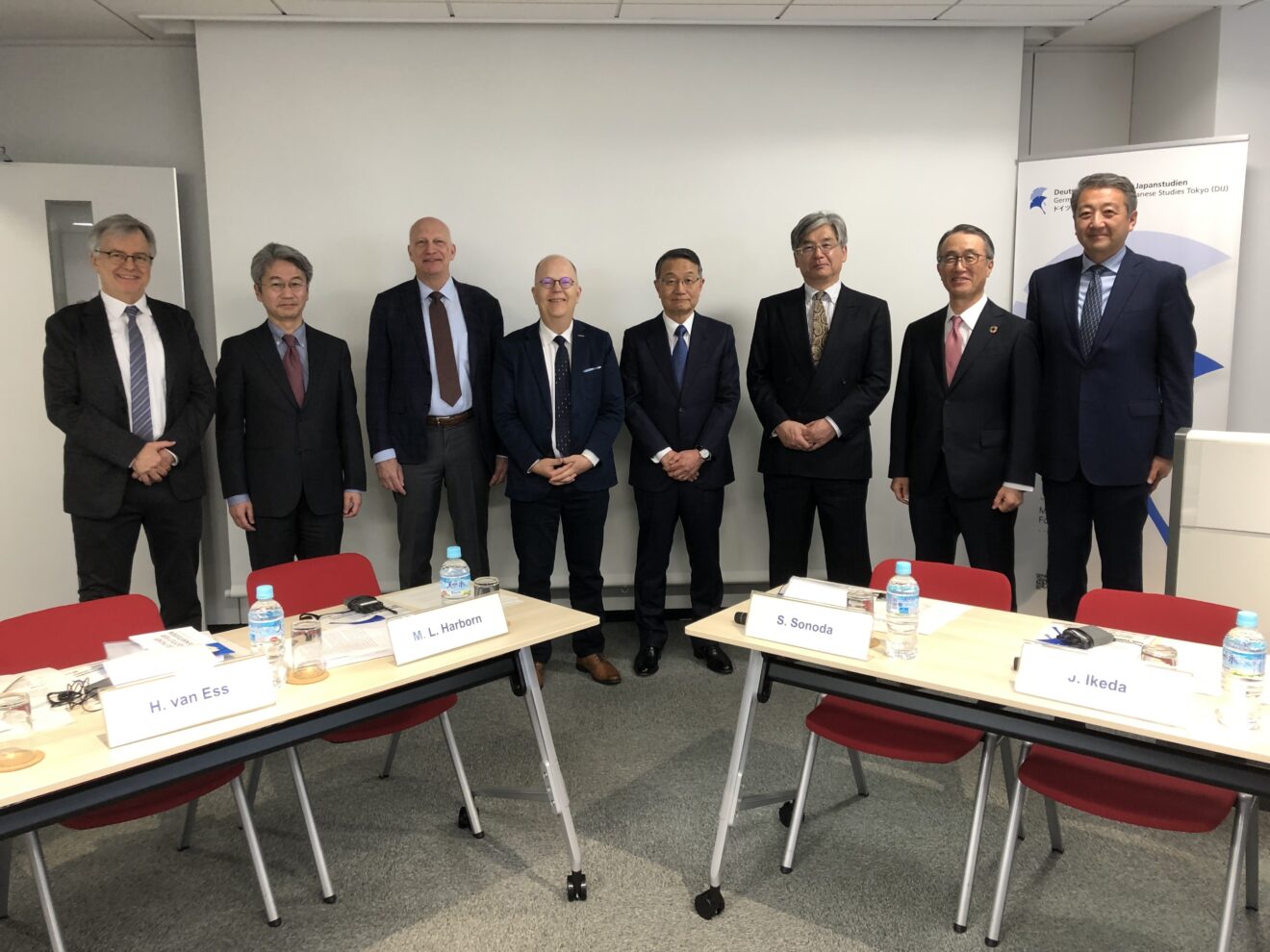
|
Photo © DIJ
|
Report on Experts' Dialogue on China
Partner, competitor, opponent? The conference 'How to Deal With China' was hosted by the DIJ in April and co-organized with Global Asia Studies (Institute for Advanced Studies on Asia, University of Tokyo) and the Japan Association of Corporate Executives. It brought together eight European and Japanese experts on China with backgrounds in business and academia to discuss and weigh diverse perspectives, experiences, and recommendations for a sound China strategy. A report on this event is now available on our event website and the MWS China blog.
|
|
|
|
|
|
Catchword・Aktueller Begriff ・流行語
|
|
|
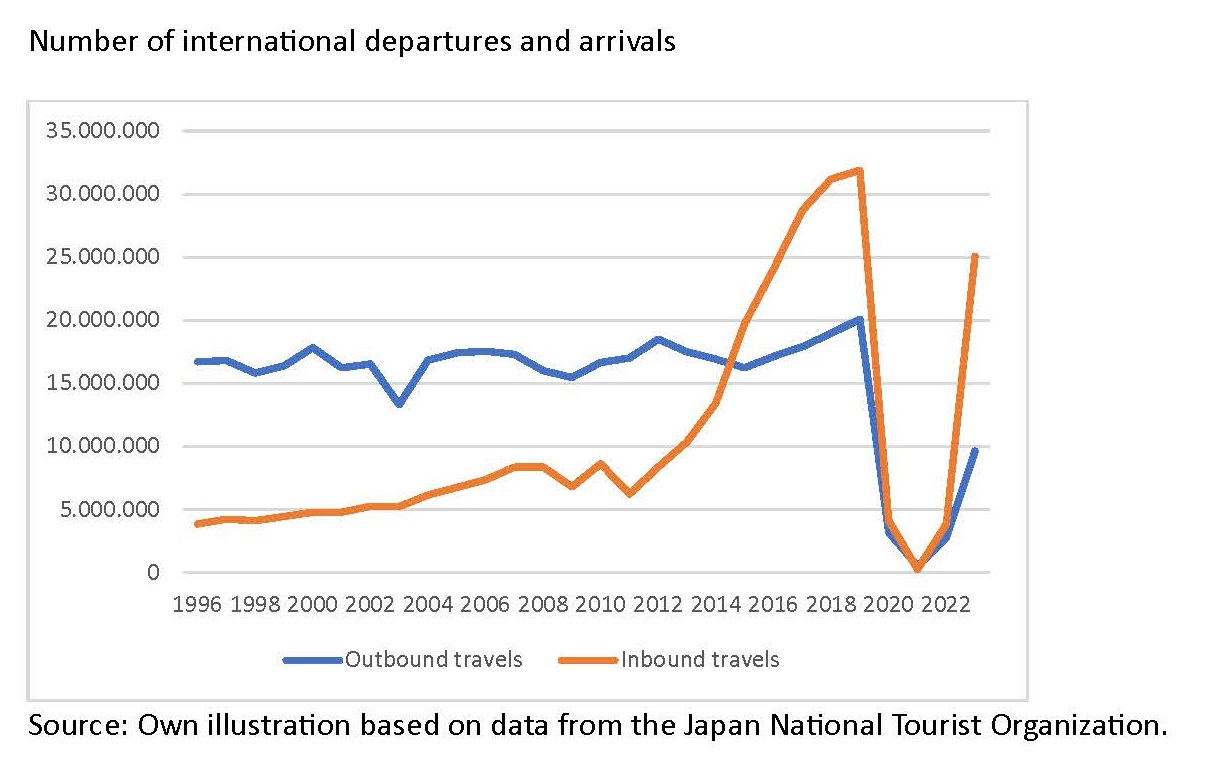
|
Chart © Franz Waldenberger
|
|
'Overtourism': Too Many Tourists in Japan?
|
|
Following the lifting of coronavirus-related entry restrictions and fueled by the cheap yen, inbound tourism to Japan rapidly increased over the last two years. The tourist-boom generated revenues of 5.4 trillion yen in 2023, contributing 0.9% to gross domestic expenditure. However, in many places Japan’s infrastructure is not prepared for peaks in demand and many feel that there is ‘overtourism’ (ōbā-tsūrizumu), particularly in Kyoto, Tokyo, and Nara. In this edition of the Catchword series, Franz Waldenberger explains how Japan tries to balance the advantages and problems of being a popular tourist destination.
|
|
|
|
|
|
|
|
|